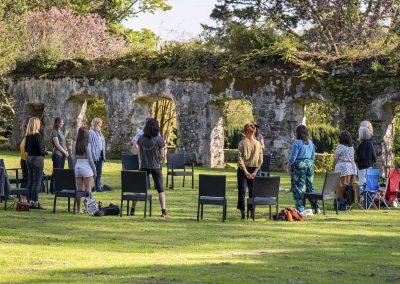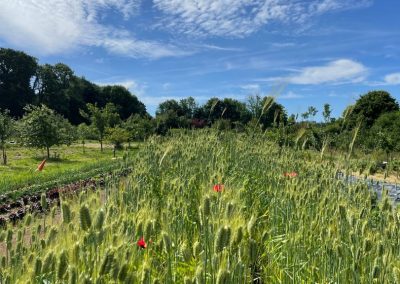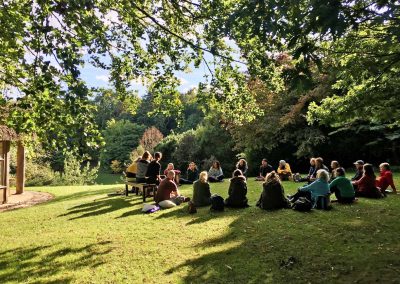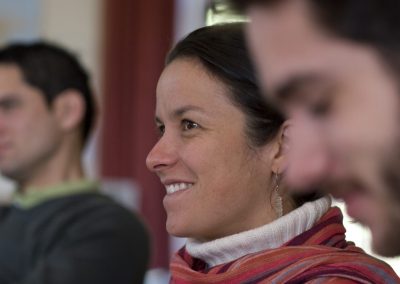WHEN:
Tuesdays from 11 March – 29 April 29 2025 | ONLINE 8-week co-operative inquiry
Weekly 1.5 hour seminars on Tuesdays at 12.00 noon UK time. Weekly inquiry groups with one faculty facilitator on Thursdays – inquiry groups will meet at a near local time [eg Europe, Americas, Australia] and the lecturers will make arrangements with participants accordingly. In addition, there will be pre-recorded videos, online responses, and further video inputs made in response to the unfolding inquiry.
TUTORS:
Freya Mathews, Peter Reason, Andreas Weber, Stephan Harding, and Sandra Wooltorton will offer videos and weekly seminars. Inquiry groups will be facilitated by Stephan, Sandra, Ezekiel Fugate, and Jacqueline Kurio
VENUE:
This course will be conducted virtually, with meetings on Zoom and video presentations via YouTube.
AGE SUITABILITY:
About this course
A panpsychic view starts from the understanding that all things, including the Earth itself, are integral to the fabric of the living cosmos, all of the same sentient cloth. Mind is a fundamental aspect of matter just as matter is a fundamental aspect of mind: we are part of a world that has depth as well as structure, meaning as well as form. In Thomas Berry’s words, this is a community of subjects, not a collection of objects.
During this 8 week online course, we will explore this perspective through a co-operative inquiry with Rivers in the vicinity of participants: if we invoke their living presence, address them as subjective persons, what manner of response might we receive? Rivers may include everything from mountain torrents through mature watercourse to tidal reaches; underground flows, wild streams or industrialized waterways.
We live at a time of ecological catastrophe. But what underpins the destructiveness of modern humans—those socialized into the industrial growth society—is the worldview through which we experience ourselves as separate from the world around us. We may allow the ‘higher animals’ some sentience, but beyond that the world of natural objects is seen as composed of inert matter, operating according to causal laws, with no subjectivity or intelligence, no intrinsic purpose or meaning. In this view humans, and humans alone, possess mind and subjectivity. The natural conclusion is that it is human destiny to control, manipulate and benefit from the material resources of the planet; increasingly powerful technologies amplify the effects of this perspective.
We believe that as well as all the activities seeking to make practical changes to our civilization, we also need a radical alteration of our lived experience, to feel ourselves directly as participants in the process of life on earth. This requires a different way of looking at the world; and new ways to integrate this into everyday living. Such an alternative is offered by living cosmos panpsychism, as outlined by ecophilosopher, Freya Mathews; the biology of wonder or “biopoetics”, as explained by biologist, Andreas Weber; the animate Gaian perspective of ecologist Stephan Harding; and biocultural stewardship articulated by Sandra Wooltorton.
From a panpsychic perspective, the cosmos is One, a coherent field of mind/matter, that in its evolution differentiates into Many, self-realizing and self-reflexive beings. These beings, the community of subjects, reach out to each other in mutual contact and communication, co-creating a ‘poetic ecology’: the fundamental erotics of being touched by the world and touching it in return. For example, it is now widely accepted that trees in a forest are not just a collection of individuals but are in continual communication with each other and with the fungi that interpenetrate their roots.
In this relational ecological reality, a communicative order, an order of meaning, unfolds alongside the causal, material order. Of course, this doesn’t take place in human language: it is necessarily a poetic order, conveying meaning in image and metaphor, taking place not in words or concepts, but through material form in a language of things. Modern humans are alienated from this poetic order: if we conceive the world as brute object it will only reveal itself as such. But if we invoke a living presence then we may receive a meaningful response—if we are open to it.
We have chosen to focus our inquiry on Rivers, recognizing their significance within ecosystems and their integration with the land and creatures around them; as well as the extent that they have been influenced for better and worse by human activities.
Format:
This course will take the form of co-operative inquiry, a form of inquiry pioneered by Peter Reason, in which all participants work together as both co-inquirers and as co-subjects. In this panpsychic inquiry, participants are both human and non-human. All are engaged in the design and management of the inquiry; all are involved in the experience and action that is being explored; all are involved in making sense and drawing conclusions. Participants work together through cycles of action and reflection, developing their understanding and practice by engaging in what Peter has called an ‘extended epistemology’ of experiential, presentational, propositional and practical ways of knowing.
In addition, there will be video inputs on the panpsychic perspective, co-operative inquiry, biopoetics, animate Earth and biocultural stewardship from the faculty which will provide frameworks for the inquiry process.
After an initial seminar for orientation and getting to know each other, there will be six cycles of action and reflection. In each action phase, participants will explore their relationship with their local River, invoking their living presence, and attending to the response (if any). Our invocation can be through loving presence and attunement, through song, prayer, pilgrimage, ceremony and festival; through the languages of myth, archetype and art; for some, through the language of traditional religion. Following this, in a reflection phase, participants will share their experience, seek to make sense together, and design the next cycle of engagement. Finally, there will be time for reflections, recapitulation and composing final conclusions.
In addition to the inquiry groups there will be weekly seminars for all participants. Faculty members will each expand on their particular perspective and engage in discussion with participants. There will also be two seminars in which participants will work in the whole community to identify and draw out shared themes. To further facilitate exchange across inquiry groups, participants will be partnered with one or two of their fellows from another group.
Weekly Commitment:
Detailed arrangements for online collaboration will be sent to participants if the course is confirmed. The minimal commitment to the course is: one encounter with the River each week; composing and posting an account of the encounter; reading and commenting on one fellow participant’s account; participating in a Zoom reflection meeting facilitated by a lecturer; contributing to community discussions.
Participants must be prepared to spend significant time outside, possibly in inclement weather. They must make sure they have appropriate clothes, waterproofs, walking boots, flask and whatever else will help make them comfortable in their local climate. Participants are responsible for undertaking their own individual risk assessment to ensure their health and safety.
Please note: The Living Waters course is part of a wider piece of research available to the public and is undertaken by the tutors and the participants. By joining this course, you are giving consent to being part of this research process.
what participants said about this course
For years I have felt like an experience in search of a meaning: I have had the experience of connection discussed in the course but not an understanding of that experience. Now I have them both and feel much more integrated.
Big changes in my attitude towards natural elements, which were already intense but not very structured. More self-confidence about my stance.
TUTORS
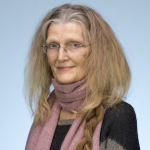
Freya Mathews
Freya Mathews is Adjunct Professor of Environmental Philosophy at Latrobe University, Australia. Her books include The Ecological Self (1991), Ecology and Democracy (editor) (1996), For Love of Matter: a Contemporary Panpsychism (2003), Journey to the Source of the Merri (2003), Reinhabiting Reality: towards a Recovery of Culture (2005), Without Animals Life is not Worth Living (2016) and Ardea: a philosophical novella (2016). She is the author of over eighty articles in the area of ecological philosophy. Read More
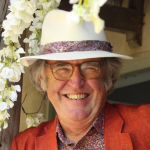
Peter Reason
As Director of the Centre for Action Research in Professional Practice at the University of Bath, Peter Reason was an international leader in the development of participative approaches to action research. In these forms of experiential inquiry all are co-researchers, contributing both to the thinking that forms the research and to the action that is its subject. Read More
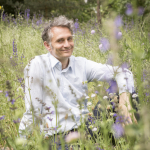
Andreas Weber
Andreas Weber is a Berlin-based philosopher, biologist, and writer. He holds degrees in marine biology and cultural studies, and has collaborated with brain researcher and philosopher Francisco Varela. His books in English include: Enlivenment: Towards a Fundamental Shift in the Concepts of Nature, Culture and Politics (2013); The Biology of Wonder: Aliveness, Feeling, and the Metamorphosis of Science (2016); and Biopoetics: Towards an Existential Ecology (2016). Read More
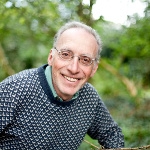
Stephan Harding
Stephan was one of the founding members of Schumacher College, and led and lectured on the college’s MSc Holistic Science for nearly two decades - teaching on the core models of the programme, as well as on several short courses at the College. Stephan holds a doctorate in behavioural ecology from the University of Oxford. He has been involved in ecological field research in Zimbabwe, Venezuela and Costa Rica, where he was Visiting Professor in Wildlife Management at the National University. Stephan is author of Animate Earth as well as Gaia Alchemy and Poems of Lorca: Courting the Dawn, translated with Martin Shaw. Read More
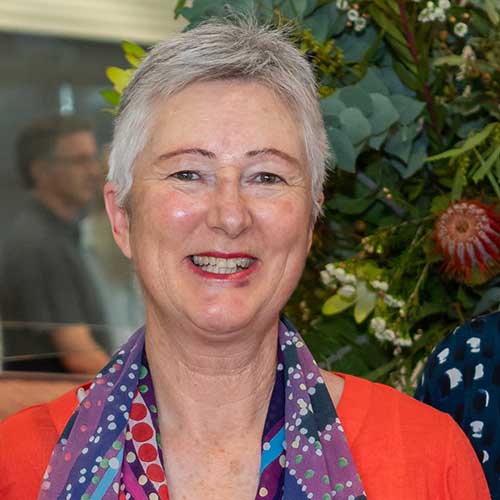
Sandra Wooltorton
Sandra is from Noongar Boodjar, also known as southwest Western Australia, and she works as a Senior Research Fellow at the Nulungu Research Institute at the University of Notre Dame Australia, in Yawuru Country around Broome in the Kimberley region of northern Western Australia. She acknowledges Noongar traditional owners, and Aboriginal custodians in Australia and elsewhere. Read More
Book now
Begin your online booking below. You will receive an e-ticket for this event. You are welcome to email us at shortcourses@dartington.org or call us at 01803 847008 with any queries you have. Full Short Course T&Cs can be found here >
If you place a deposit, you will be contacted by us four weeks before the course start date to pay the outstanding balance. You will also be contacted with full details about the course before you arrive.
Please note that in most cases bookings for all our Short Courses close at midday on the Thursday before the course begins. This enables us to give you the best possible course experience and ensures all bookers receive the relevant course materials before they arrive.


